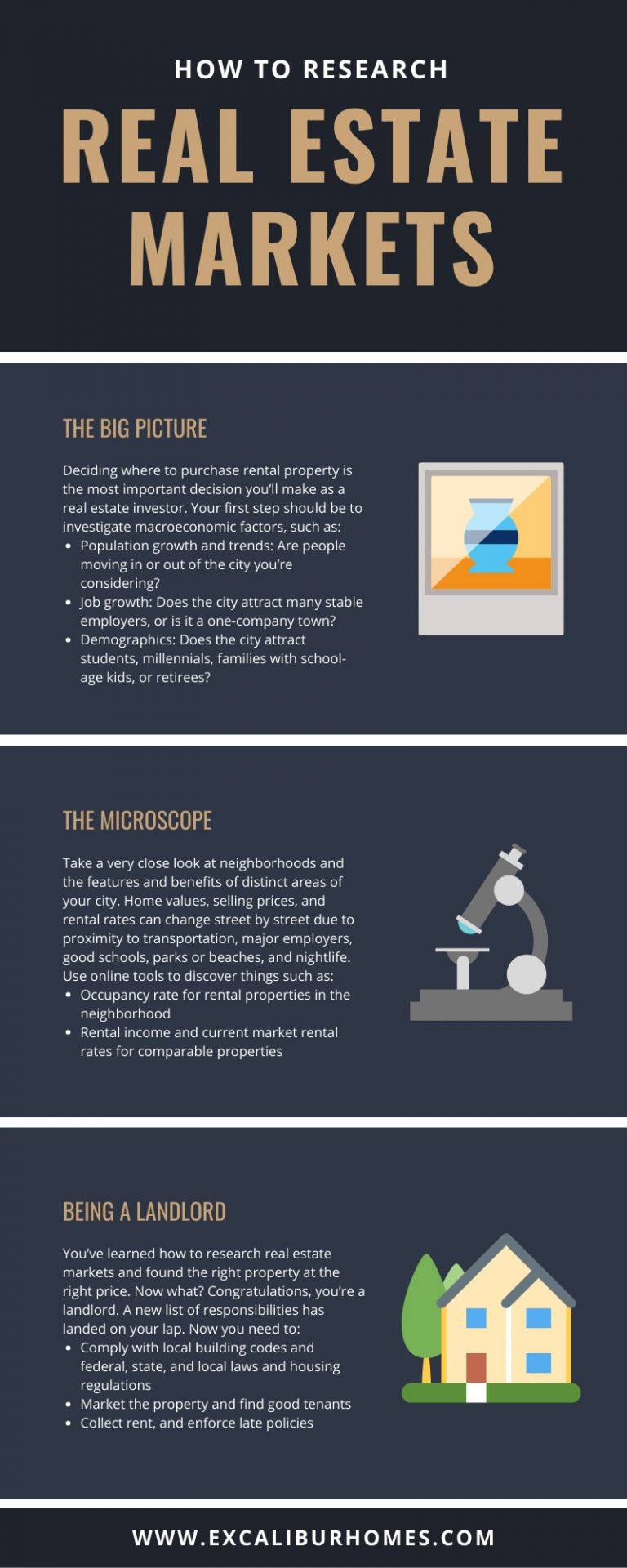How to Research Real Estate Markets

If you’re considering getting into real estate investing, you must know how to research real estate markets. Investigating the macroeconomic and microeconomic conditions of the locations you’re considering before you make the decision to invest is essential.
The Big Picture
Deciding where to purchase rental property is the most important decision you’ll make as a real estate investor. Your first step should be to investigate macroeconomic factors, such as:
- Population growth and trends: Are people moving in or out of the city you’re considering?
- Job growth: Does the city attract many stable employers, or is it a one-company town?
- Demographics: Does the city attract students, millennials, families with school-age kids, or retirees?
- Taxes and expenditures: How much does the city collect in property and sales taxes, and how does it spend that revenue? Are revenues rising or falling? Does the city offer any incentives to investors?
Most cities will prepare a kind of annual report called a Comprehensive Annual Financial Report (CAFR). This document may seem like a dreary collection of columns of numbers, but those numbers could be critical to your investing decision. The CAFR will tell you about the overall economic condition of the city you’re considering. Census data can give you a historical perspective as well.
Once you’ve looked at these numbers, you must then do a real estate market analysis. Dive into online resources to determine things such as the current housing inventory, list versus sale prices, and average days on the market. This will tell you whether you’re looking at a seller’s or a buyer’s market. Ideally, you want to find a buyer’s market that has the potential to grow into a seller’s market within the time frame you plan to own and rent out the property. This way, when you’re ready to sell, you’ll have the market advantage.
Consider whether the city you’re looking at will have properties available within your budget. Certain “hot” real estate markets with booming economies and great jobs have developed severe housing shortages that have driven prices up substantially. Also think about how you intend to finance the purchase—will you be buying with all cash, or do you need to arrange a mortgage loan for your investment property? If the latter is the case, research the current interest rates and types of loans that may work for you as an investor.
Look into the local rental market specifically: check out construction trends to see whether builders are putting up more rental apartments or single-family homes, and find out if there’s a strong short-term rental trend in the area. Some cities or towns may prohibit short-terms rentals (such as Vrbo and Airbnb), while others embrace the concept. If you’re considering purchasing property as a short-term rental in an area that permits that type of arrangement, think about whether you’ll be able to attract renters year-round or if the area attracts primarily seasonal renters. If you purchase property in a college town, consider whether it will stay occupied in the summer.
The Microscope
Now that you’ve narrowed down your target cities by assessing economic factors and the overall temperature of the real estate market, it’s time to take a very close look at neighborhoods and the features and benefits of distinct areas of your city. Home values, selling prices, and rental rates can change street by street due to proximity to transportation, major employers, good schools, parks or beaches, and nightlife. Use online tools to discover things such as:
- Occupancy rate for rental properties in the neighborhood
- Rental income and current market rental rates for comparable properties
- CAP rates (net operating income divided by purchase price) and spread (the difference between the CAP rate and the debt service rate. For example: if the property has a cap rate of 6% and the mortgage is at 4%, the spread is 2%). Do not include mortgage cost when calculating CAP rates.
- CoC return (“Cash on Cash”—this is annual net operating income divided by total cash investment. When calculating CoC return, include the cost of financing.)
Next, compare features of the property itself with others at comparable prices. This is where you look at a property using considerations similar to the ones you’d use if you were purchasing it as your own home. Consider:
- Number of bedrooms
- Number of bathrooms
- Total square footage
- Lot size
- Age of the building, recent upgrades, and condition of mechanical systems such as HVAC, plumbing, and electrical
- Condition of the interior (paint, appliances, floors)
- Extras such as finished basements, fireplaces, decks, fences, landscaping, and curb appeal
- Sales history: Has the property’s selling prince increased each time it has changed hands?
- Comps: Recent sales of comparable homes in the neighborhood, time on the market, pending sales, and expired listings give you insight into fair pricing for the property.
- Taxes
If the property looks good and it’s within your budget, enlist the services of an experienced local realtor who could represent you as a buyer and provide deep local insight. Perhaps the home looks great because it’s close to schools, parks, and public transportation—but maybe your realtor knows that a major highway project that will increase traffic and noise near the home is coming or that a big property tax increase is in the works.
Being a Landlord
You’ve learned how to research real estate markets and found the right property at the right price. Now what? Congratulations, you’re a landlord. A new list of responsibilities has landed on your lap. Now you need to:
- Comply with local building codes and federal, state, and local laws and housing regulations
- Market the property and find good tenants
- Prepare a solid lease with all the necessary elements, such as duration; monthly rent; rent due date; notice requirements; limitations on the number of people who can occupy the home; responsibilities for trash disposal, utilities, and maintenance; and restrictions (painting or other alterations, pets, smoking)
- Collect rent, and enforce late policies
- Respond to tenant complaints and maintenance requests
If you’ve settled on the greater Atlanta area as a promising real estate investment market, but you live several states away, consider hiring our Georgia lease and property management company to take care of all of this and more for you. As an experienced property management firm, Excalibur Homes will take care of local responsibilities, from compliance with housing regulations to collecting rent to hiring tradespeople for repairs and maintenance. This way, you can concentrate on collecting your income and determining where to invest in your next rental property.




